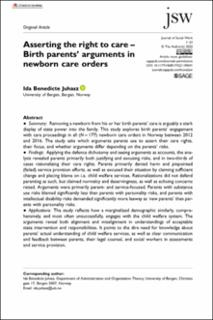Asserting the right to care – Birth parents’ arguments in newborn care orders
Journal article, Peer reviewed
Published version

Åpne
Permanent lenke
https://hdl.handle.net/11250/3013411Utgivelsesdato
2022Metadata
Vis full innførselSamlinger
- Department of Government [457]
- Registrations from Cristin [9791]
Sammendrag
Summary
Removing a newborn from his or her birth parents’ care is arguably a stark display of state power into the family. This study explores birth parents’ engagement with care proceedings in all (N = 177) newborn care orders in Norway between 2012 and 2016. The study asks which arguments parents use to assert their care rights, their focus, and whether arguments differ depending on the parents’ risks.
Findings
Applying the defence dichotomy and seeing arguments as accounts, the analysis revealed parents primarily both justifying and excusing risks, and in two-thirds of cases rationalizing their care rights. Parents primarily denied harm and pinpointed (failed) service provision efforts, as well as excused their situation by claiming sufficient change and placing blame on i.e. child welfare services. Rationalizations did not defend parenting as such, but claimed normalcy and deservingness, as well as echoing concerns raised. Arguments were primarily parent- and service-focused. Parents with substance use risks blamed significantly less than parents with personality risks, and parents with intellectual disability risks demanded significantly more leeway as ‘new parents’ than parents with personality risks.
Applications
The study reflects how a marginalized demographic similarly, comprehensively, and most often unsuccessfully, engages with the child welfare system. The arguments reveal both alignment and misalignment in understandings of acceptable state intervention and responsibilities. It points to the dire need for knowledge about parents’ actual understanding of child welfare services, as well as clear communication and feedback between parents, their legal counsel, and social workers in assessments and service provision.
